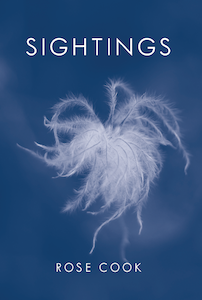Sightings, Rose Cook
Grey Hen Press (Hen Run), 2019 £4.00
The speed of sight
Seeing — that noticing of what’s around us — is something we take for granted. It’s a part of the totality of being aware. Rose Cook’s opening poem, ‘Sightings’, draws attention to the impact of sudden sights, where unexpected immediacy comes as a shock —
Saw the whale flex its muscular back against blue water,
not far out, the shiver of a god.
Saw a seal make her way along the shore,
head round and black, slow flippers, trawling a sea
pink with sunset. Saw it.
By omitting the ‘I’ and going straight for the verb, along with repeating ‘saw’ three times in only five lines, she gives her poem the equivalent of rapid jotting. This takes the reader directly to the visual experiences; they’re right before your eyes.
Yet the personal is still present in the two-word sentence ‘Saw it’. The ‘I’ is not just implied, but thumping the table. That ‘Saw it’ made me recognise how Cook gives foreground to both the whale and the seal. If you remove this sentence fragment from the poem, the two sightings are slower, more reflective; put it back in and you have two words that say, in effect, Me! Me! I was the one who saw it! It was me! (My re-wording is clumsy but I hope it makes the point.) In two words Cook has condensed the knocked-sideways excitement and speed of seeing that makes the animal world vivid.
If the whole pamphlet were written with this intensity, the impact would be lost. What Cook achieves in Sightings is a demonstration of the various speeds with which we might see detail and action in the natural environment.
‘Dance’, for example, is a considered record of ‘whirling insect clouds’ that last all day.
‘Watching them dive’ lingers over the movements of gannets and tern as they dive for fish; here the act of watching is slower, allowing for comparison.
I began to think about the synonyms for ‘see’, and their differences: watch, look, spot, observe — you can add to the list.
It’s that snappy ‘Saw it’ that pointed the way.
D A Prince
reviewer from Sphinx